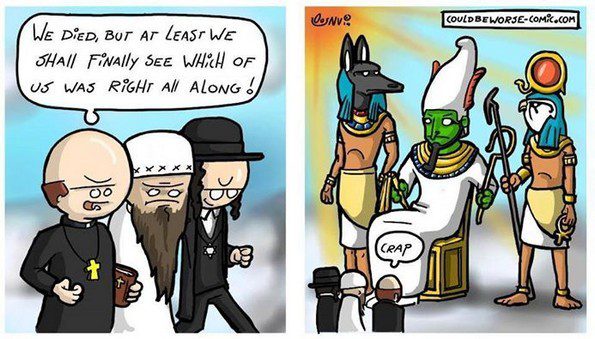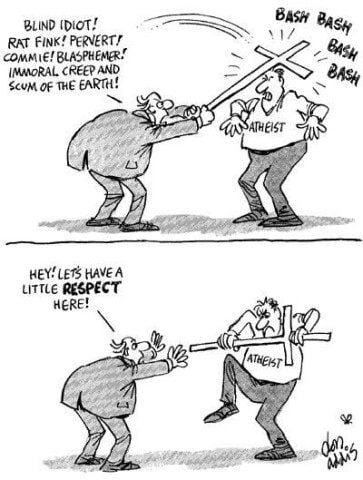
“Revival Fires” is a self-professed Evangelical Christian who frequents this site, leaving a plethora of hateful, nasty comments. He does the same on social media. Revival Fires has an obsession with prison rape and anal sex. I have repeatedly tried to get him to see that his behavior is not consistent with the teachings of the Bible. By appealing to his divine “authority,” I thought he might see the error of his ways and repent. Sadly, he is incorrigible, and I have finally figured out why.
Revival Fires recently left a response to a comment by my friend Ben Berwick. Calling Ben BirdDick, here’s what he had to say:
There is no such thing as a “good Christian “. No one is good. All are depraved and in need of his grace.
In twenty-two short words, Revival Fires reveals why he behaves like he does. You see, Revival Fires ill-bred behavior is driven by his theology; particularly his warped understanding of Christian salvation and human nature.
A saved person, according to the Bible, is a new creation in Christ. II Corinthians 5:16-17 says:
From now on, therefore, we regard no one from a human point of view; even though we once knew Christ from a human point of view, we no longer know him in that way. So if anyone is in Christ, there is a new creation: everything old has passed away; look, new things have come into being!
The Bible says a lot about personal holiness, without which no man shall see the Lord. In Matthew 5-7, commonly called The Sermon on the Mount, Jesus sets forth the requirements to be a Christian. Not suggestions, requirements. In the Beatitudes, found in Matthew 5:3-12, Jesus said:
Blessed are the poor in spirit, for theirs is the kingdom of heaven. Blessed are those who mourn, for they will be comforted. Blessed are the meek, for they will inherit the earth. Blessed are those who hunger and thirst for righteousness, for they will be filled. Blessed are the merciful, for they will receive mercy. Blessed are the pure in heart, for they will see God. Blessed are the peacemakers, for they will be called children of God. Blessed are those who are persecuted for the sake of righteousness, for theirs is the kingdom of heaven. Blessed are you when people revile you and persecute you and utter all kinds of evil against you falsely on my account. Rejoice and be glad, for your reward is great in heaven, for in the same way they persecuted the prophets who were before you.
Jesus goes on to say in Matthew 5:13-16:
You are the salt of the earth, but if salt has lost its taste, how can its saltiness be restored? It is no longer good for anything but is thrown out and trampled under foot. You are the light of the world. A city built on a hill cannot be hid. People do not light a lamp and put it under the bushel basket; rather, they put it on the lampstand, and it gives light to all in the house. In the same way, let your light shine before others, so that they may see your good works and give glory to your Father in heaven.
These verses strongly suggest that Revival Fires is not a Christian. The Apostle Paul said in Galatians 5:
Now the works of the flesh are obvious: sexual immorality, impurity, debauchery, idolatry, sorcery, enmities, strife, jealousy, anger, quarrels, dissensions, factions, envy, drunkenness, carousing, and things like these. I am warning you, as I warned you before: those who do such things will not inherit the kingdom of God. By contrast, the fruit of the Spirit is love, joy, peace, patience, kindness, generosity, faithfulness, gentleness, and self-control. There is no law against such things. And those who belong to Christ have crucified the flesh with its passions and desires. If we live by the Spirit, let us also be guided by the Spirit. Let us not become conceited, competing against one another, envying one another.
Paul contrasts the works of the flesh with the works of the Spirit. He states that the fruit of the Spirit is — singular, present tense. Not fruits — pick and choose — but fruit, singluar. The fruit of the Spirit is not a grand objective. No, dear followers of Jesus, Paul declares that if you have the Holy Spirit living inside of you, these behaviors will be evidenced in your life. Again, these verses make it clear that Revival Fires is not indwelt by the Holy Spirit. In other words, he is not a Christian.
Revival Fires ignores these verses, justifying his atrocious behavior by saying the Bible says that no one is good; that all of us are depraved and in need of God’s grace. In other words, God didn’t do shit for him, behavior-wise. He sees himself as a depraved sinner and behaves accordingly. Revival Fires has a warped understanding of the Christian gospel. In his mind, salvation is gained by affirming a set of propositional truths. “Believe these things and you shall live,” Revival Fires thinks. (And to be fair, I have met a lot of Evangelicals who think this way, especially Independent Fundamentalist Baptists.) Revival Fires bastardized gospel is little more than a momentary transaction at the church altar where he prayed the sinner’s prayer and Jesus saved him. Lots of IFB churches preach this corrupt gospel. Have you ever wondered why so many IFB readers think I am still a Christian? This is why. At the age of fifteen, I assented to a set of theological propositions, prayed a prayer, and Jesus gloriously saved me — forever. No matter how I live my life, I am a Christian. I could be a rapist, serial killer, or atheist and still be a Christian. Why? The Bible says nothing can separate the Christian from the love of Christ.
Revival Fires thinks he is saved, and nothing he does can revoke his ticket to Heaven. Awesome, right? Sin all you want, you are still saved. Misuse and abuse people, you are still saved. Break every law in the Bible, you are still saved. Tell me again, why, exactly, Jesus died on the cross and ressurected from the dead?
Of course, this question must be asked: If Christian salvation doesn’t change your life, what good is it?
Bruce Gerencser, 68, lives in rural Northwest Ohio with his wife of 47 years. He and his wife have six grown children and sixteen grandchildren. Bruce pastored Evangelical churches for twenty-five years in Ohio, Texas, and Michigan. Bruce left the ministry in 2005, and in 2008 he left Christianity. Bruce is now a humanist and an atheist.
Your comments are welcome and appreciated. All first-time comments are moderated. Please read the commenting rules before commenting.
You can email Bruce via the Contact Form.





